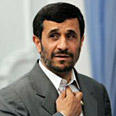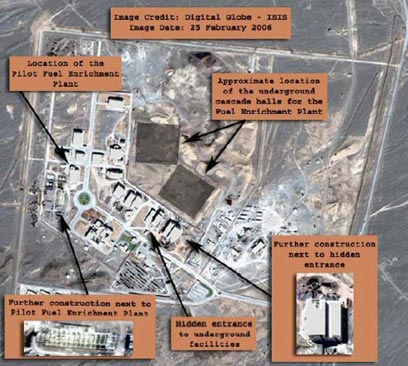
Iranian president confirms Iran testing advanced centrifuges
Ahmadinejad reveals new array of 6,000 advanced centrifuges recently tested, found to work five-times as fast as current models. And while France says more sanctions will likely be needed, Russia champions new tactic of offering incentives
Iranian President Mahmoud Ahmadinejad confirmed on Tuesday evening that nuclear researchers in the country have begun conducting experiments with a new array of centrifuges.
Speaking at a celebratory evening in Tehran marking the annual National Nuclear Technology Day, Ahmadinejad announced that 6,000 new centrifuges used in the enrichment of uranium were recently tested for the first time and found to be capable of operating at five times the speed of the P-1 models currently employed by Iran's nuclear program.
The president initially spoke of the new centrifuges while touring a new research facility at the Natanz nuclear plant earlier in the day. Calling the development a 'breakthrough," Ahmadinejad said this heralded the beginning of the elimination of the dominance of "the big powers'' over nuclear energy.

Aerial view of uranium enrichment facility in Natanz (Photo: Reuters/DigitalGlobe)
The announcement represented a major bid by Iran to expand uranium enrichment – a process that can produce either fuel for a nuclear reactor or material for a warhead.
Iran already has about 3,000 centrifuges operating at its underground nuclear facility in Natanz. This is the commonly accepted figure for a nuclear enrichment program that is past the experimental stage and can be used as a platform for a full industrial-scale program that could churn out enough enriched material for dozens of nuclear weapons over time.
En route to more sanctions?
Tehran continues to say its nuclear program is intended only to produce energy, not develop weapons as the US and many of its allies fear, but diplomats in Vienna warned last week that Iran's installing of advanced enrichment centrifuges at the underground Natanz facility could give Tehran the means to make atom bombs in the future if it chose to.
Permanent members of the UN Security Council, which has already imposed three sets of sanctions against Iran for its refusal to suspend uranium enrichment, were divided on how to respond, as Iran had already rejected one European package of incentives last week.
"I fear that we will have to continue on the path of sanctions if we do not receive a response from the Iranians," French Foreign Minister Bernard Kouchner said in Paris.
However, Russia's Foreign Minister Sergey Lavrov said there was no need for new sanctions. Instead, he told Ekho Moskvy radio that diplomats from the US, Russia, China, Britain, France and Germany would offer Iran new economic, energy, and security incentives to halt uranium enrichment.
The Associated Press contributed to this report










